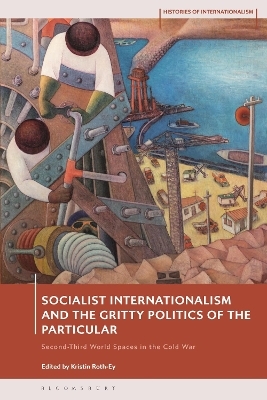
Socialist Internationalism and the Gritty Politics of the Particular
Bloomsbury Academic (Verlag)
978-1-350-30281-5 (ISBN)
These ordinary spaces are examined to understand how they were conceived, constructed, shaped and reshaped by people over time. Many are physical places of encounter, while others are more abstract, embodying ideological goals. In exploring these spaces the contributors show how the Second and Third World actors understood them and connected them to ideas such as gender and space, the space of the nation, of the modern and of the self. Essentially, it seeks to unravel how these spaces between Second and Third Worlds worked, and what, if anything, was distinctive and consequential about them.
Second-Third World Spaces in the Cold War explores the ways in which these Second and Third World actors collaborated and clashed in these everyday spaces, and brings these multi-faceted, multi-actor histories to a vital centre ground.
Kristin Roth-Ey is Associate Professor of Modern Russian History at the UCL School of Slavonic and Eastern European Studies, UK. She is the author of Moscow Prime Time: How the Soviet Union Built the Media Empire that Lost of the Cultural Cold War (2011). Her current research focuses on Soviet media and cultural diplomacy in the Third World during the Cold War.
Introduction, Kristin Roth-Ey (University College London, UK)
1. The School: Integrating North Korean children within socialist Eastern Europe, 1951-1959, Péter Apor (Hungarian Academy of Sciences, Hungary)
2. The Airwaves: How Do You Listen to Radio Moscow? Moscow’s Broadcasters, ‘Third World’ Listeners, and the Space of the Airwaves in the Cold War, Kristin Roth-Ey (University College London, UK)
3. The Great Industrial Project: Space, Sovereignty, and Production Cultures at Egypt’s Aswan High Dam, Elizabeth Bishop (Texas State University, USA)
4. The Exhibition: Spaces of Cultural Encounters, Radina Vucetic (University of Belgrade, Serbia)
5. The Epistolarium: Socialist Internationalism Writ Small: Friendship, Solidarity and Support between Women in the Soviet Union and in Decolonising Countries, 1950s-1960s, Christine Varga-Harris (Illinois State University, USA)
6. The University. The Decolonisation of Knowledge?: The Making of the African University, the Power of the Imperial Legacy, and the Eastern European Influence, Malgorzata Mazurek (Columbia University, USA)
7. The Expert Community: Expert Knowledge and Socialist Virtues- Czechoslovak Military Specialists in the Global South, Mikuláš Pešta (Charles University Prague, Czech Republic)
8. The Military Training Camp: Experiences of PAIGC guerrillas in Soviet Training Camps, 1961-1974, Natasha Telepneva (University of Strathclyde, UK)
9. The Hospital: Romania’s “One Nation Hospital” in Gharyan, 1974-1985, Bogdan C. Iacob (Institute of History Bucharest, Romania)
10. The Trade Union: Kindred by choice. Trade unions as interface between East Africa and East Germany, Eric Burton (University of Innsbruck, Austria)
11. The Everyday Space: The hostel, the pub, and the prison: Vietnamese and Cuban Workers in 1980s Czechoslovakia, Alena K. Alamgir (Georgia Institute of Technology, USA)
12. The Travelogue. Imagining Spaces of Encounter: Travel Writing Between the Colonial and the Anti-Colonial in Socialist Eastern Europe, 1949-1989, Eric Burton, Zoltán Ginelli, James Mark, and Nemanja Radonjic (University of Innsbruck, Austria, National University of Public Service Budapest, Hungary, University of Exeter, UK )
Bibliography
Index
| Erscheinungsdatum | 15.10.2024 |
|---|---|
| Reihe/Serie | Histories of Internationalism |
| Zusatzinfo | 10 bw illus |
| Verlagsort | London |
| Sprache | englisch |
| Maße | 156 x 234 mm |
| Themenwelt | Geschichte ► Allgemeine Geschichte ► Neuzeit (bis 1918) |
| Geschichte ► Allgemeine Geschichte ► Zeitgeschichte | |
| Geschichte ► Teilgebiete der Geschichte ► Kulturgeschichte | |
| ISBN-10 | 1-350-30281-3 / 1350302813 |
| ISBN-13 | 978-1-350-30281-5 / 9781350302815 |
| Zustand | Neuware |
| Haben Sie eine Frage zum Produkt? |
aus dem Bereich


